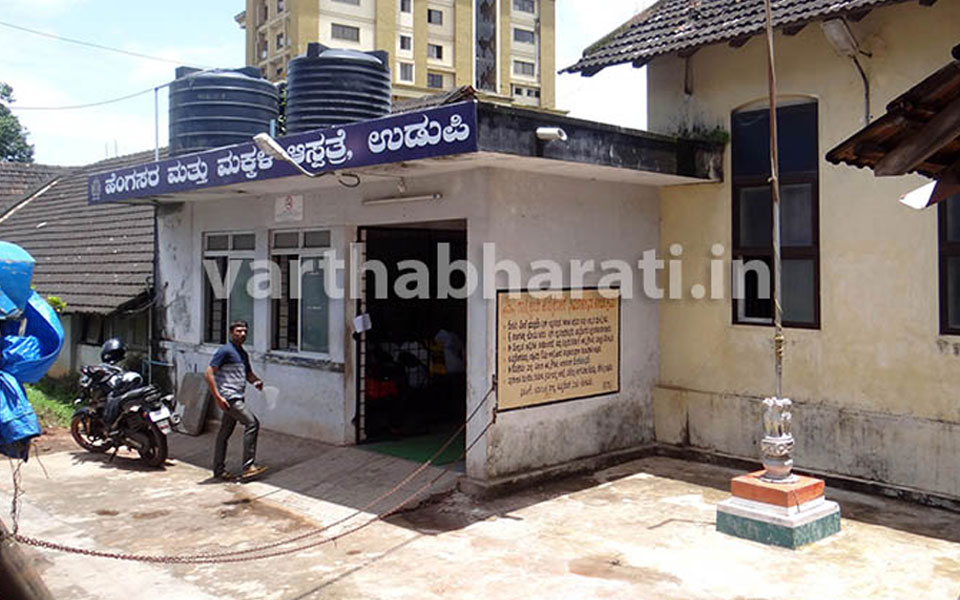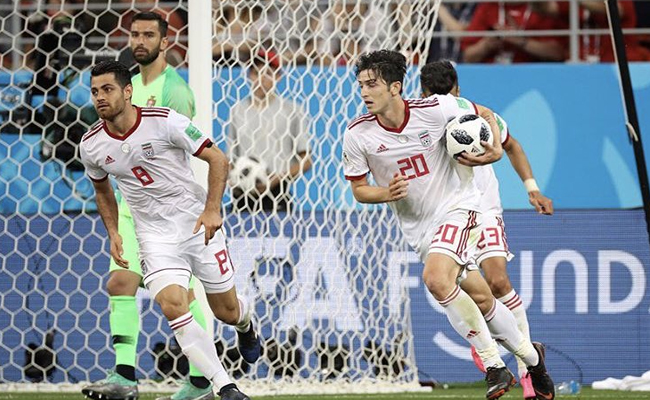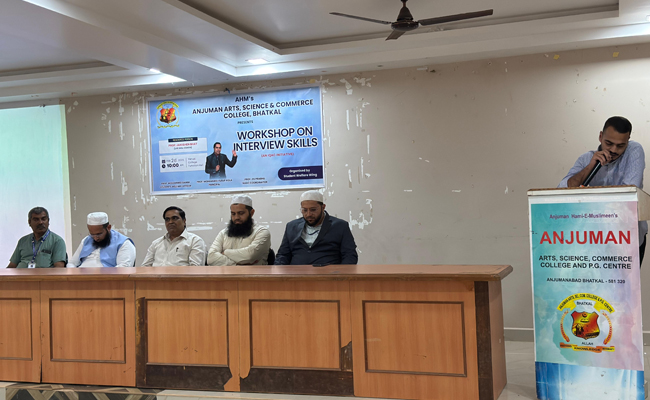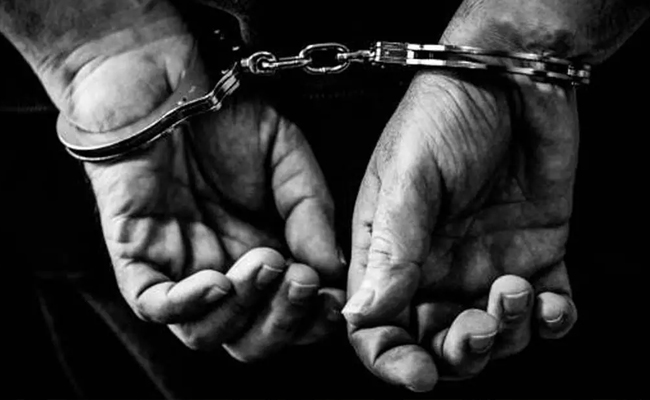Udupi, September 24: The Haji Abdulla Hospital, known as the government maternity and child care hospital in the district which was the lifeline for the poor people, not only in the district, but also in neighbouring districts for almost eight decades downed its shutters officially on Monday.
From tomorrow, the hospital will be shifted to the Karnataka Government Koosamma Shambhu Shetty Haji Abdulla Memorial Mother and Child Care Hospital, constructed by the Bengaluru-based BRS Health and Research Institute of NRI businessman BR Shetty, just besides the old building.
After then President Pranab Mukherjee had inaugurated the hospital on November 19, 2017, the out-patient section was shifted to the new hospital building as per the agreement from last July. Almost half of the services of the government hospital were shifted then itself.
In a circular issued by the Commissioner of the Health and Family Welfare department on August 29, he directed the authorities to shift all the services including out-patient and in-patient divisions to the 200-bed multi-specialty hospital with immediate effect. With this, the Commissioner has directed to close the government Maternity and Child Care hospital permanently.
Known philanthropist of Udupi, Haji Abdulla had constructed the hospital in 1930s for the poor on a sprawling four acres of land. Later, the state government and the Health and Family Welfare department have agreed to give the land to the BRS Health and Research Institute Private Limited for 30 years lease. The BRS Health and Research Institute Private Limited has constructed 200 –bed hospital instead of 70-bed hospital on land behind the Mahatma Gandhi Government Primary School and named the hospital after ‘Karnataka Government Koosamma Shambhu Shetty Haji Abdulla Memorial Mother and Child Care Hospital’. The government has said that like in the previous hospital, all the services would be free in the new hospital also.
As per the agreement, the BRS Institute would demolish the existing Maternity and Child care Hospital and construct 400-bed capacity Centre Of Excellence Hospital (Super Specialty Hospital) and Community Health Facilities shortly.
Four docs hired
Total 31 staff including six specialist doctors were working in the previous Government Maternity and Child Care Hospital. Among them , the government has deputed four doctors including two pediatricians and two gynecologists to the new hospital on temporary basis. But he did not get any order for the remaining 27 staff including two doctors, said district surgeon Dr Madhusudhan Nayak.
As there was scarcity of doctors and staff, he had appealed the state government to depute all the staffs to the district hospital. Once again, he had written to the government seeking deputation of all the staff, he said.
Among in-patients, except the patients who will discharge in a couple of days, all the patients would be shifted to the new hospital, Dr Nayak said.
The government has asked him to send some of the equipment to the Vijayapura hospital and they would be sent. For remaining equipment, the decision would be taken as per the direction of the government, he said.
Though five maternity and gynecologists were appointed in the new hospital, two government doctors were deputed as the hospital may require them during emergency situation. As the new hospital did not get eligible pediatricians, two doctors were deputed from the old hospital, he said.
Scholar G Rajashekar said that the government benefit was the right of the people. But the service to be provided by the private would become a donation. The poor people have been getting the benefits as their rights and now onwards such facilities would not continue in the new hospital. It might affect the poor patients, he said.
4.64 lakh patients got treatment in last three years
Though the hospital has been serving in the centre of the city for the last eight decades, in the last three years, the hospital has treated 4, 64,176 poor patients. Among them, 4, 32, 756 patients were given treatment as out-patients and 31,420 got treatment as in-patients.
During 2016-17, total 1, 67, 203 out-patients and 11,925 in-patients, 1,79,761 out-patents and 13, 708 in-patients in 2017-18 and till August 2018-19, 85,792 out-patients and 5787 in-patients have got the treatment in the hospital.
Let the Truth be known. If you read VB and like VB, please be a VB Supporter and Help us deliver the Truth to one and all.
Geneva (AP): Iran's place at the men's World Cup in three months' time was put in doubt Monday amid an escalating Middle East conflict sparked by the soccer tournament's co-host the United States.
Iran is due to play its three group stage games in the U.S. — two in Inglewood, California, then in Seattle — from June 15-26. Cities in Canada and Mexico also will host some of the 104 games.
The U.S. and Israel have targeted Iran in coordinated attacks since Saturday that killed Supreme Leader Ayatollah Ali Khamenei and dozens more senior officials.
It provoked an Iranian response that aimed missiles at U.S. allies including 2022 World Cup host Qatar and Saudi Arabia, which FIFA has picked to stage the 2034 edition.
“What is certain is that after this attack, we cannot be expected to look forward to the World Cup with hope,” said Iran's top soccer official Mehdi Taj, a vice president of the Asian Football Confederation.
It is unclear if the state-backed Iranian soccer federation could refuse to send its team to the 48-nation tournament that starts June 11, or the U.S. government could effectively block the team.
FIFA has declined comment since Saturday, when secretary general Mattias Grafström said it would “monitor developments around all issues around the world.”
The White House's top official overseeing World Cup preparations, Andrew Guiliani, seemed unconcerned Saturday in a social media post.
“We'll deal with soccer games tomorrow,” Guiliani wrote about Iran, “tonight, we celebrate their opportunity for freedom.”
Here is a look at the issues in play:
Asian soccer power
==============
Iran has one of the best national teams in Asia and has qualified for six of the past eight World Cups.
It is No. 20 in the FIFA world rankings of 211 teams, and has not been lower than No. 24 since the last World Cup in Qatar.
Iran was among the second-seeded teams in the World Cup draw held in Washington, D.C. in December, minutes after U.S. President Donald Trump was presented with the inaugural FIFA Peace Prize.
Though Taj and other Iranian soccer officials were denied visas to enter the U.S., the draw outcome was favorable for Iran, especially in the expanded format where most third-place teams advance to the knockout rounds.
Iran starts against low-ranked New Zealand, then plays one of the weaker top-seeded nations, Belgium, and finishes against Egypt.
Iran is likely to be supported in stadiums by its diaspora in the U.S., though residents of the Middle East nation are subject to a ban on entering the country.
Trump's government has promised exemptions from its travels bans for athletes and coaches arriving for major sports events like the World Cup.
Politics around Iran inside World Cup stadiums is nothing new. Protests over domestic issues were aired by Iran fans at the last World Cup.
The FIFA rules
===========
FIFA's World Cup regulations envisage a team withdrawing, or being excluded, from the tournament though the legal language is vague to say the least.
In that scenario, according to Article 6.7, “FIFA shall decide on the matter at its sole discretion and take whatever action is deemed necessary.”
“FIFA may decide to replace the Participating Member Association in question with another association,” the rules say.
That legal framing seems to give FIFA president Gianni Infantino wide powers to shape any decision relating to Iran.
Just 18 months ago, the decision announced by Infantino to add Lionel Messi's team Inter Miami to the 2025 Club World Cup lineup appeared to have no basis in formal tournament rules.
Consequences of withdrawingShould Iran pull out of the World Cup — still hugely speculative — its soccer federation would forfeit at least $10.5 million.
FIFA pays $9 million in prize money to each of the 16 federations whose teams fail to advance from the group stage, and all 48 qualified teams get $1.5 million “to cover preparation costs.”
The Iranian federation also would face disciplinary fines from FIFA — at least 250,000 Swiss francs ($321,000) for withdrawing up to 30 days before the tournament, and at least 500,000 Swiss francs ($642,000) if the decision is in the last month before kickoff.
Iran would risk being excluded by FIFA from qualifying for the next World Cup in 2030 as well.
Next in line
========
Iran was a fast World Cup qualifier last March, earning one of eight guaranteed places allocated to the Asian Football Confederation.
Should Iran pull out, the likely replacement from Asia should be Iraq or the United Arab Emirates.
Iraq and the UAE were effectively the ninth and 10th-ranked Asian teams through the various qualifying groups and advanced to a two-leg playoff last November.
Iraq won 3-2 on aggregate — eliminating the UAE — to advance to the intercontinental playoffs in Mexico and, on March 31, it is scheduled to play an elimination game against Bolivia or Suriname with a World Cup place at stake.
One possible element of uncertainty is the language of the World Cup tournament rules.
FIFA wrote that it can decide to replace a withdrawn team “with another association,” though without specifying the replacement must come from the same continental confederation.





